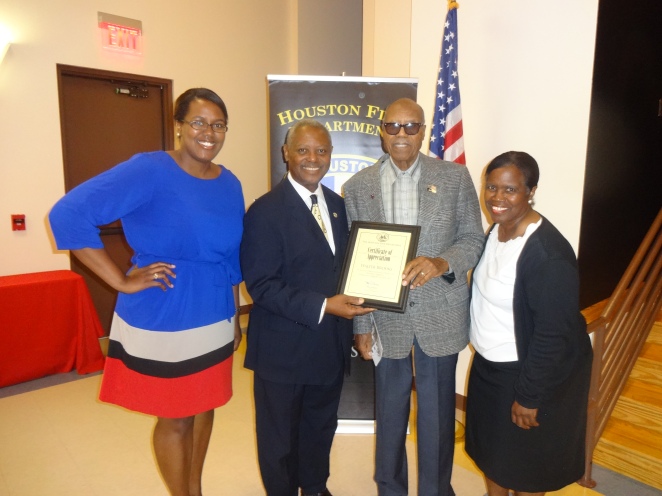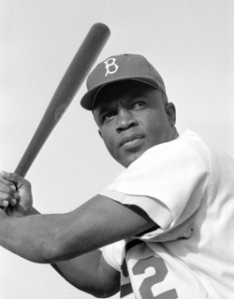Walter T. Brooks did not have childhood aspirations of becoming a firefighter.
However, when Brooks heard the Houston Fire Department was seeking African Americans to integrate their stations, he applied, knowing he had a wife and two small children and needed steady work.
In 1955, the City of Houston annexed Clinton Park, a predominantly black neighborhood located in east Houston. Prior to this, Clinton Park had an all-volunteer fire station operated by blacks. With the annexation, city officials wanted the station’s equipment and building but not the volunteer firefighters. This was intolerable to many of Clinton Park’s residents.
Consequently, under then-mayor Roy Hofheinz, an end soon came to segregation of the Houston Fire Department with the city seeking to hire African Americans.
“I needed a steady job,” said Brooks. “I wasn’t thinking about making history.”
Out of nearly 1, 000 applicants, 10 black men, including Brooks, were chosen as the first African Americans to participate in firefighter training. The others were Clifford Thompson, Samuel Kemp, James Perry, Willie Bright, Garnet C. Young, Milton Alford, John Hayes, W. D. Cooper and Alfo Craven.

(Photo: Cierra Duncan) Walter T. Brooks and family with Houston City Council Member Andrew Burks at the 7th Annual Houston Fire Department Trailblazer’s Breakfast.
Brooks, 90, joined the fire department after serving in the Navy for three years and going to vocational school on the GI Bill. He was a government employee, shipping ammunition to Korea, when he heard of the firefighter openings. Brooks decided to apply for a position because he was concerned about government cutbacks and job security.
“I didn’t know how long I’d be working under the government ordinance,” said Brooks. “I had been reduced in salary two or three different times. The fire department was somewhere where you potentially could never be laid off. I was most interested in a job that would support my family.”
Brooks and the other men were officially hired on August 7, 1955 and assigned to Fire Station 42, the former Clinton Park Volunteer Fire Station. However, amidst the nation’s racial tensions of the time, it would soon become obvious that all were not supportive of a black operated fire station.
“It was something new to them as well,” said Brooks. “You could see white people riding up and down Clinton Drive, slowing down, and looking into the station.
“Some of the firefighters would say when they went to a fire the [white] people would want them to take off their boots to enter their house to put out a fire.”
The black firefighters did not face a great deal of racism from white firefighters but they still heard occasional remarks made by them in the midst of conversation.
“I was driving the grass-wagon on my way to a fire and I heard a district chief say ‘black smoke is coming out of nigger county’ over the radio,” said Brooks. “I don’t know if it slipped but he wasn’t talking directly to us. Three or four years later, that type of talk was cut out.”
After time, many of the original black firefighters sought promotions. Often times, however, they were given the wrong information to study, leaving them ill-prepared for the required exams. In other instances, even with high test scores, they were simply looked over because some people were still uncomfortable with the idea of a black man being in charge of whites.
Brooks described it as a “hard feeling” seeing others promoted when he knew he was equally, if not more, qualified and had similar test scores.
Eventually, through hard work and many hours of studying, Brooks was promoted to Inspector. When Houston adopted a new fire code many business owners were unhappy when Brooks enforced it.
“Today, they still have the same problems I had with violations when I was an inspector,” said Brooks. “People would tell me they have been in business 25 years and no one has told them anything. I still wrote them up!”
Brooks would eventually retire in 1984 after 29 years of honorable service with the Houston Fire Department.
Brooks and the nine others who comprised the first group of blacks to integrate the Houston Fire Department did not pursue the job in an attempt to make history. They were men looking for steady jobs and paychecks in order to support their families. However, their bravery and the obstacles they overcame while working paved the way for equality in the Houston Fire Department.
“At the time I wasn’t thinking about black history,” said Brooks. “The Houston Fire Department has grown to be one of the best fire departments in the nation over the years. I’m very proud to have been one of the first ten blacks in the Houston Fire Department and to serve the great people of this city. It was rewarding for me and a great opportunity. If I had to do it over, I’d do it again.”
